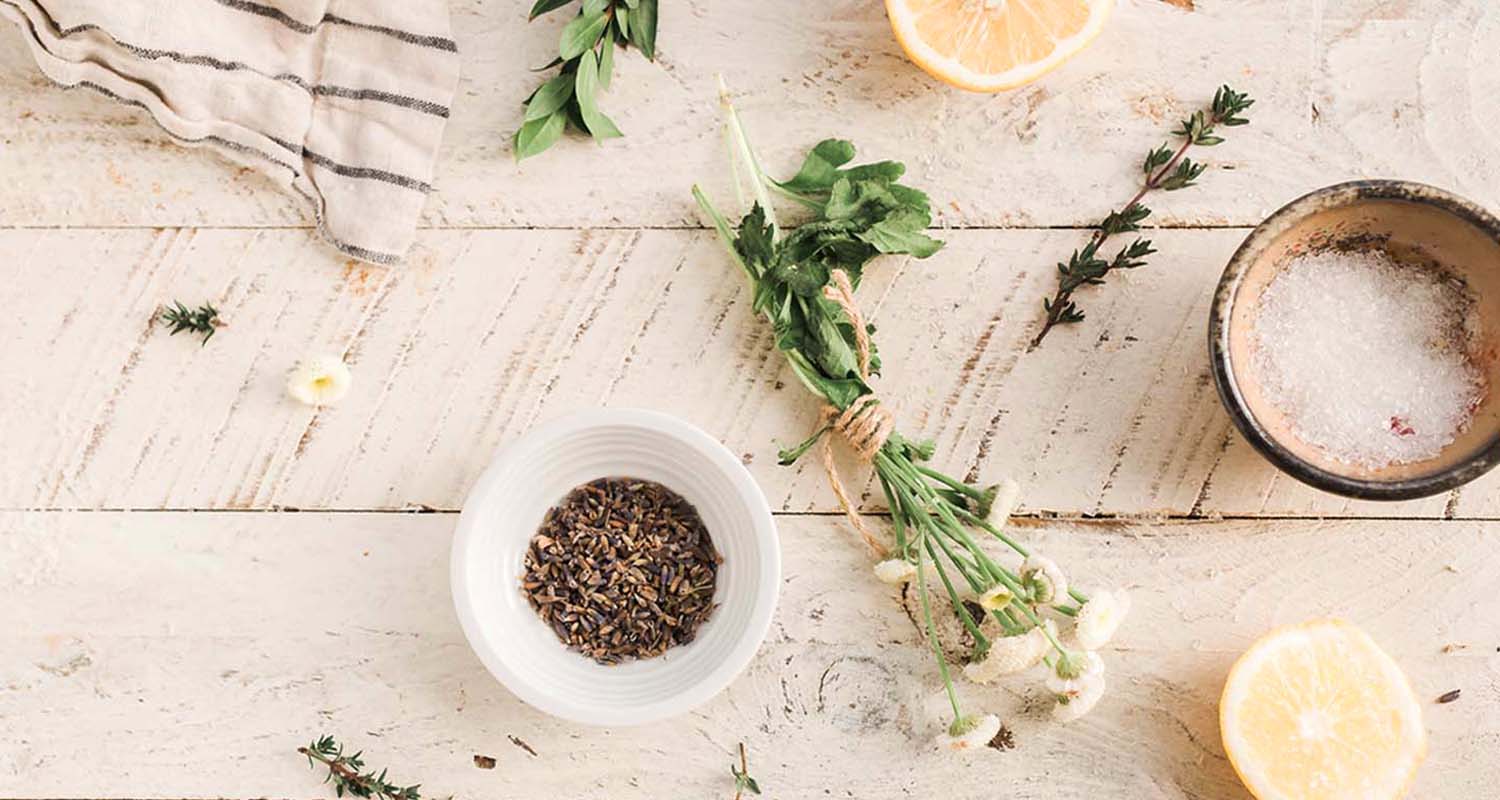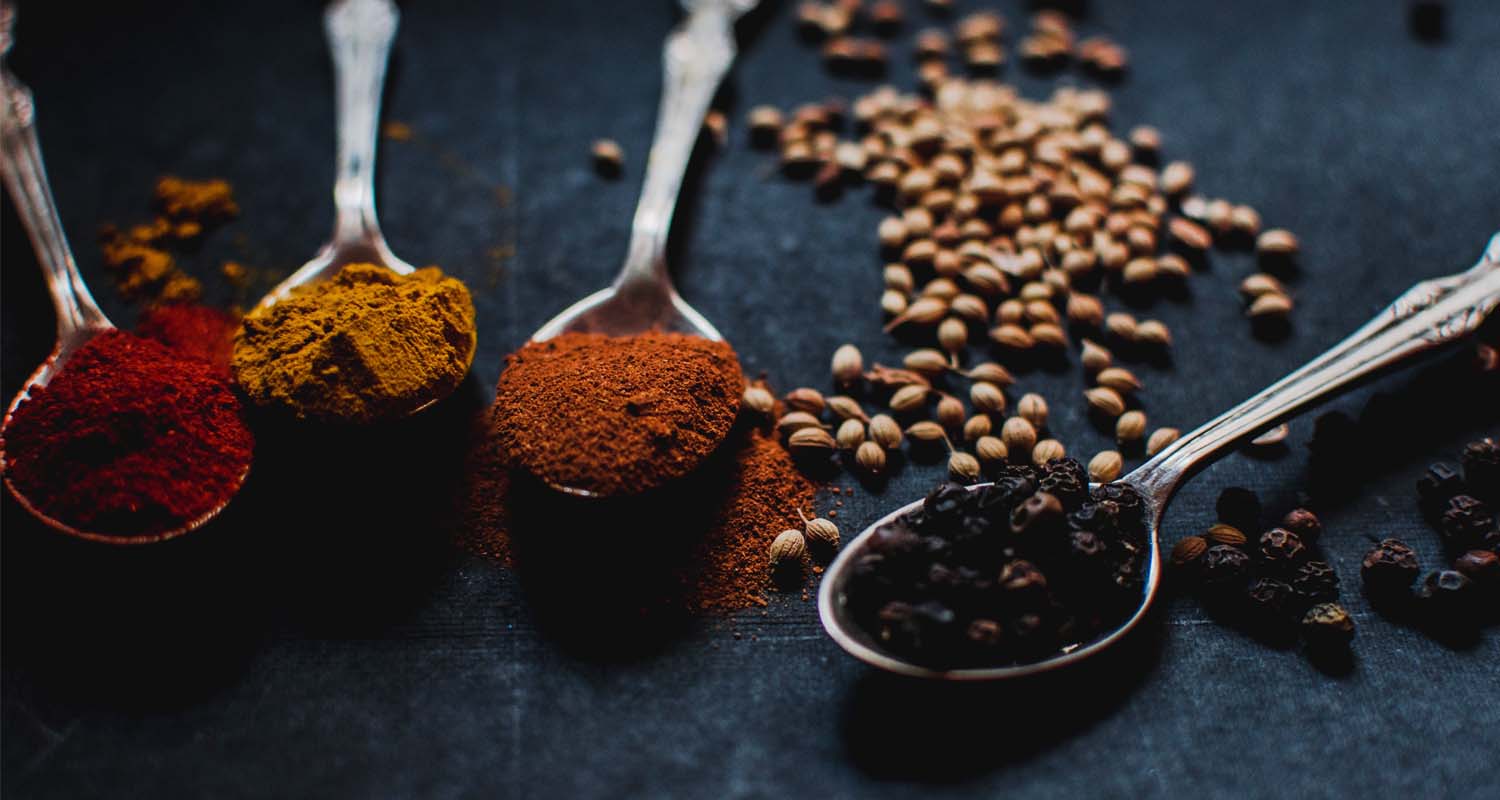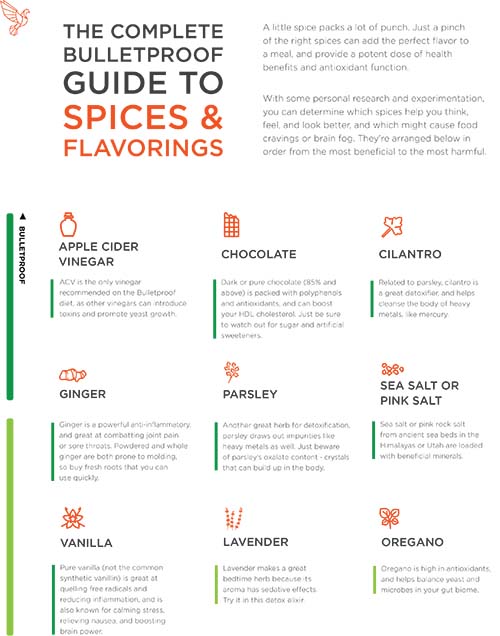
- Many spices are potent sources of anti-inflammatory antioxidants
- Use high-quality, recently opened herbs and spices to avoid mold and toxins
- Download this roadmap to spices to help you maximize you meals’ flavor and function, while reducing exposure to molds, toxins and anti-nutrients
A little spice packs a lot of punch. Just a pinch of the right spices can add the perfect flavor to a meal, and provide a potent dose of health benefits and antioxidant function. Many herbs and spices boost your gut biome (the friendly bacteria that help you digest your food), reduce inflammation and improve mental performance, but some can impact your performance with antinutrient exposure or psychoactive compounds.
With some personal research and experimentation, you can determine which spices help you think, feel, and look better, and which might cause food cravings or brain fog. The herbs, spices, and other flavorings in The Bulletproof Diet Roadmap (download the roadmap free here) are organized to help you maximize the benefits of spices and keep you firmly in charge of your own biology.
Read on for an in-depth guide to spicing up your Bulletproof Diet.
Spices that combat inflammation
Antioxidants in the Bulletproof Diet fight inflammation by neutralizing free radicals and preventing them from damaging your cells. When you think of antioxidant-packed foods, spices probably aren’t the first thing to come to mind. While fresh berries and leafy greens may have the spotlight, certain spices and herbs are potent antioxidants, and powerhouses for reducing inflammation.
The Top 7 Anti-Inflammatory Herbs and Spices you can use to increase your performance now are packed with antioxidants, and likely already in your kitchen. Just half a teaspoon of ground Ceylon cinnamon has as many antioxidants as half a cup of blueberries, and half a teaspoon of dried oregano has the antioxidant power of three cups of raw spinach.
Related: Lower Inflammation With Cinnamon
Avoid mold toxins in your spices
Many of the plants used as spices contain naturally strong antifungal and antibacterial oils, but aggressive strains of mold can still thrive in your spice rack. “The “Bulletproof Diet” book details how and why mold contaminates our food, and all the best practices to avoid exposure.
Because of this known risk, it’s common practice in the spice industry to irradiate commercial herbs and spices. This sterilization process may kill mold, but destroys antioxidants, and leaves behind mold toxins.
Mold spores are all around us, and irradiated or not, a jar of spices can make a prime incubator. Think of all the times you’ve sprinkled herbs into a steaming pot of food, then sealed them back up with that moisture to sit another month on the shelf. One of the simplest things you can do to make your spices work for you is to use high-quality, recently opened, fresh or dried herbs and spices, and toss out any that are more than a few months old. And never store spices in warm, humid environments.
Spices with especially high mold toxin risk include black pepper, powdered garlic, nutmeg, and paprika, which is one of the reasons why they are suspect in the Bulletproof Diet. Other reasons include lectins (binding proteins that can reduce the body’s ability to absorb nutrients) and in the case of garlic, it affects brain waves
What flavorings should I use?

- Use high-quality, recently opened, fresh or dried herbs and spices
- Buy organic when possible
- There is always room for personal experimentation. It’s up to you to decide where you go on the roadmap and how that makes you feel and perform
- Check for added sugars, sweeteners or fillers in spice blends and condiments
Apple cider vinegar
ACV is the only vinegar recommended on the Bulletproof diet, as other vinegars can introduce toxins and promote yeast growth.
Chocolate
The real stuff, not kryptonite candy bars. Dark or pure chocolate (85% and above) is packed with polyphenols and antioxidants, and can boost your HDL cholesterol. Just be sure to watch out for sugar and artificial sweeteners. A better option: high-quality cacao or cocoa powder.
Cilantro
Related to parsley, cilantro is a great detoxifier, and helps cleanse the body of heavy metals, like mercury.
Ginger
Ginger is a powerful anti-inflammatory, and great at combatting joint pain or sore throats. Powdered and whole ginger are both prone to molding, so buy fresh roots that you can use quickly.
Parsley
Another great herb for detoxification, parsley draws out impurities like heavy metals as well. Just beware of parsley’s oxalate content — crystals that can build up in the body, causing kidney stones, muscle weakness, and painful sex.
Sea salt or pink salt
Sea salt or pink rock salt from ancient sea beds in the Himalayas or Utah are loaded with beneficial minerals.
Vanilla
Pure vanilla (not the common synthetic vanillin) is great at quelling free radicals and reducing inflammation, and is also known for calming stress, relieving nausea, and boosting brain power.
Lavender
Lavender makes a great bedtime herb because its aroma has sedative effects. Try it in this detox elixir. Drink as tea or use as aromatherapy.
Oregano
Oregano is high in antioxidants, and helps balance yeast and microbes in your gut biome.
Rosemary
Rosemary possesses anti-inflammatory and anti-cancer properties. Add rosemary to marinades to keep the fat in meat from oxidizing at high heat.
Thyme
Another good antioxidant, thyme also has antifungal effects, and helps protect fats from oxidation under heat.
Turmeric
Turmeric has antioxidant, anti-inflammatory, antiviral, antibacterial, antifungal, and anticancer activities, and thus has potential against various diseases, diabetes, allergies, arthritis, Alzheimer’s disease, and other chronic illnesses.
Cinnamon
Ceylon cinnamon helps you regulate your blood sugar and reduce insulin resistance, along with guarding against irritable bowel syndrome and stomach flu, while increasing memory and response times.[ref url=”http://www.wju.edu/about/adm_news_story.asp?iNewsID=1882&strBack=/about/adm_news_archive.asp “][ref url=”http://www.life-enhancement.com/magazine/article/669-insulin-improves-cognitive-function-in-healthy-adults”] Even small doses of the cheaper and more common Cassia cinnamon can lead to liver damage in sensitive people.[ref url=”http://www.bfr.bund.de/en/press_information/2012/26/cassia_cinnamon_with_high_coumarin_contents_to_be_consumed_in_moderation-131836.html”]
Cloves
Cloves are extremely rich in antioxidants, including the flavonoids kaempferol and rhamnetin. The spice also protects against the inflammation that underlies heart disease, cancer, and the other chronic diseases.[ref url=”https://pdfs.semanticscholar.org/8980/8a009ebed204d1d98c0b206f0655de4ca2fd.pdf”]
Extracts
Pure, organic, plant-based extracts such as vanilla, oregano, or mint are safe to use in small quantities, but make sure you know what your buying. Watch out for artificial imitations, and remember that the term “natural flavors” in the ingredient list is an umbrella term that allows hundreds of nasty ingredients to go under the radar. does not mean a product is safe, or even very “natural” at all.
Prepared mustard with no additives
Go for high-quality, organic mustard, and beware of additives like sugars, vegetable oils, artificial colors, and distilled vinegar (which is often grain-derived).
Sage
Sage shows promise for its protective effect against inflammation-based neurological conditions like Alzheimer’s, boosting memory and concentration and lessening anxiety.[ref url=”https://www.ncbi.nlm.nih.gov/pmc/articles/PMC5318325/”][ref url=”https://www.ncbi.nlm.nih.gov/pubmed/12895683?dopt=Abstract”]
Cayenne pepper
Cayenne contains a range of flavonoids and carotenoids – antioxidants that scavenge free radicals to protect against the cellular damage that leads to inflammation and disease. Capsaicin appears to have anti-cancer properties, helps induce autophagy (the body’s natural detox system),[ref url=”https://www.ncbi.nlm.nih.gov/pmc/articles/PMC4811481/”] and boosts your metabolism.[ref url=”https://www.ncbi.nlm.nih.gov/pubmed/23179202″] However, cayenne is a member of the nightshade family, and you may be sensitive to it. It is also almost as likely as black pepper to have high amounts of mold toxins in it, so quality matters when buying.
Mustard seed
Most seeds are suspect on the Bulletproof Diet, and mustard seed is no exception. Mustard contains an omega-9 fat called erucic acid that’s linked to heart lesions in rats.[ref url=”https://www.ncbi.nlm.nih.gov/pubmed/24491745″]
Onion
While delicious, onions can mess with your brain waves and negatively impact your ability to meditate, and are a nightshade, so can cause inflammation for some people. Plus, if you get them in any season except spring, they’re likely moldy.
Table salt
Table salt often contains aluminum, undisclosed fillers, and toxic anti-caking agents, so it’s best to opt for rock or sea salt instead. Because it’s been refined to pure sodium chloride, table salt also lacks other trace minerals.
Black pepper
Black pepper tends to be especially high in mold toxins,particularly aflatoxin and ochratoxin A. If you insist on using pepper, a good pepper grinder with fresh, high-end black pepper is the only way to do it.
Garlic
While garlic feeds healthy gut bacteria and has antifungal effects, it also messes with brain waves and impacts mental function. Eat it when you’re sick, instead of every day.
Nutmeg
Nutmeg has an especially high risk of mold contamination and mycotoxins. Even without the mold, nutmeg makes its own toxins, and is best used sparingly.[ref url=”https://www.ncbi.nlm.nih.gov/pmc/articles/PMC1285340/”]
Paprika
Paprika often harbors toxic mold species. As a member of the nightshade family, it contains lectins, proteins that bind to the sugars that coat the cells in your body and cause inflammation. Alkaloids can impact nerves, muscles, joints, and digestive function in some people.
Miso, tamari and tofu
Soy is almost always genetically modified to withstand insane amounts of glyphosate (a weed killer also known as Roundup), so big ag can spray them with abandon. Plus, they’re full of histamines, making them a common allergen and source of inflammation even in small amounts. Eating soy is linked to thyroid and hormone problems, and osteoporosis. Depending on your tolerance, natto — fermented soybean — and soy lecithin can be beneficial, but the Bulletproof Diet recommends avoiding all soy. Learn more about soy here.
Vinegars
Aside from apple cider vinegar, most vinegars contain significant amounts of mold toxins, yeast and fungal by-products that can rob your body of nutrients and limit your performance. Red wine vinegar, malt vinegar, and balsamic vinegar tend to be highest in anti-nutrients, including mold toxins and, in the case of balsamic, lead.
Additives
Beware of added sugars or high-glycemic sweeteners in spice blends or condiments. Check labels for kryptonite additives like sugars, milk solids, potato starch, corn starch, or MSG. Your safest bet is to make your own blends at home, like these Bulletproof Salad Dressings.
Fake foods
Hydrolyzed glutens, textured protein, and enzyme modified products aren’t products your body can recognize or use, and can be inflammatory or harmful.
Flavors
Artificial flavors often contain petrochemicals and dubious compounds, and are rarely tested for safety. Don’t be fooled by the term “natural flavors” in processed foods either, which can mean just about anything.
MSG
MSG is one of the most common artificial flavorings added to processed foods. MSG messes with the way your neurotransmitters cause the nerves in your brain to fire. MSG is an excitatory neurotransmitter that sends signals from one cell to another. Consuming it can cause the cells it activates to become overexcited. This leads to cell damage and often cell death.
Yeasts
Yeast are fungi, and often carry with them a host of toxins. Depending on the strain, yeasts can also compete with the good guys in your gut biome, and encourage candida overgrowth in the body (also known as yeast infection, athlete’s foot, athlete’s foot, ringworm, thrush…).
If you’re ready to implement what you’ve learned and fuel your performance with the right spices, read more about the best anti-inflammatory herbs and spices for your Bulletproof cooking.
Enter your email below to download your roadmap now


















